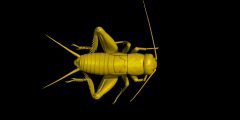Making sense of food waste: an interview with Hina Kamal
July 1, 2020
Hina Kamal is a PhD candidate with the Future Proteins project. Hina’s project is titled Food recycling: Utilising food waste for valuable proteins. Her supervisors are Prof Asgar Ali, Dr Le Cheng Fohm, and Dr Tim Parr. Hina’s research is focused on food waste recycling, in the context of understanding protein extraction methods, protein yield …
Making better proteins: an interview with Kamil Szepe
Kamil Szepe is a first-year PhD student, part of the Future Proteins Platform. Their project is titled: Improving the nutritional quality of future protein and they are supervised by Dr Simon Avery, Prof Paul Dyer, Dr Rebecca Ford, and Dr Cormac O’Shea. Kamil’s PhD investigates the effects that nutritional composition of growth media and induction …
Working with worms: an interview with Dr Carlos Lopez Viso
June 29, 2020
Carlos Lopez Viso is a postdoctoral researcher on the Future Proteins Platform. He is working on the production of mealworms as a new source of sustainable proteins for aquaculture. In order to do that, he is applying genetic techniques to modify the protein and fat content of these insects. Prior to joining the Future Food …
Understanding micronutrient deficiencies for better health: an interview with Dr Molly Muleya
June 26, 2020
Molly Muleya is a postdoctoral researcher on the Future Protein’s Platform. Molly’s research examines the protein and mineral digestibility from foods of dietary and planetary importance. Her research is at the interface of agriculture, food science, nutrition and health and seeks to understand factors across the food chain, that modify protein and mineral bioavailability of …
The Future Proteins Platform
June 24, 2020
Protein is an essential part of the human diet, providing an important building block for the body, as well as being used to build and repair tissue. As populations become increasingly wealthy, and urbanised, so the way they consume protein changes. Increased demand for meat, fish and dairy products is seen throughout the world as …
Producing future proteins sustainably: an interview with Prof Andy Salter
June 23, 2020
Andy Salter is a Professor in Nutritional Biochemistry and is leading the Future Proteins Platform, a £1 million Innovation Challenge project funded by the Future Food Beacon. Andy has worked extensively on the molecular mechanisms whereby diet impacts upon lipid metabolism and metabolic disease, particularly cardiovascular disease. In parallel, he has developed a research portfolio …









Recent Comments